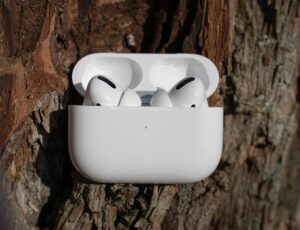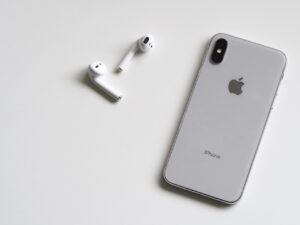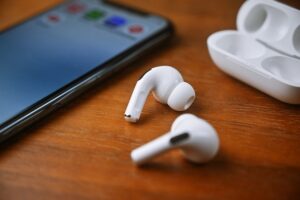AirPods stand as a popular choice among wireless earbuds enthusiasts, valuing simplicity and user-friendliness. Nonetheless, individuals may encounter microphone-related challenges, leading to difficulties in audibility for those they communicate with.
This situation can prove exasperating, particularly for those heavily dependent on AirPods for professional or personal interactions. Within this article, we delve into the potential factors contributing to the issue of others being unable to hear you through your AirPods. Furthermore, we provide insightful solutions to address and rectify this predicament.
Quick Overview: Why Can’t People Hear Me on My AirPods?
- Obstructed Microphones: Clear communication may be hampered by microphone blockage, such as dirt, debris, or earwax accumulation on the microphone grill. Use a toothbrush or soft-bristled cleaning tool to safely clean the grill, avoiding any sharp things that might harm it.
- Low Battery: Your AirPods’ microphone sensitivity may be reduced by low battery levels, producing a distant or muted sound. Make sure your AirPods are fully charged to solve this problem. Open the charging case next to your iPhone or iPad to check the battery level, or use the battery widget on your iPhone.
- Weak or Poor Connection: Communication might be hampered by microphone issues caused by a weak or poor connection. Reduce Bluetooth device congestion or decrease the distance between your AirPods and device to solve this problem. Disconnect obstructive equipment and adjust closeness as necessary.
- Firmware that is out of date: Out of date firmware may be a factor in microphone-related issues. Check for available firmware upgrades to keep your AirPods up to date. To find and apply any updates for your AirPods that are available, open the Settings app on your iPhone or iPad, pick “General,” then “Software Update.”
Obstructed Microphones
AirPods are equipped with a pair of microphones on each earbud, positioned at both the bottom and the top. These microphones serve the purpose of capturing the user’s voice during calls or interactions with Siri.

When these microphones become obstructed, it can impede the clarity of your transmitted voice. Obstructions might encompass accumulations of dirt, debris, or earwax on the microphone grill.
To address this issue, a recommended solution involves the use of a soft-bristled brush or a toothbrush to gently cleanse the microphone grill. It is crucial to steer clear of sharp objects, as they may inflict damage to the grill or inadvertently push the obstruction deeper into the earbud.
Low Battery
Another factor contributing to the issue of people being unable to hear you through your AirPods is low battery levels.
When the battery of your AirPods is running low, the sensitivity of the microphone can diminish, resulting in a faint or distant sound of your voice. To effectively address this concern, it is recommended to charge your AirPods and ensure they attain full charge before employing them.
Monitoring the battery levels of your AirPods can be achieved by either opening the charging case in close proximity to your iPhone or consulting the battery widget on your iPhone or iPad. This will provide you with insights into the current charge status of your AirPods, allowing you to maintain optimal performance during your communication sessions.
Weak or Poor Connection
AirPods establish a connection with your device through Bluetooth technology.

In scenarios where the connection experiences weakness or inadequacy, it can lead to microphone-related challenges, hindering the audibility of your voice to others. Such instances might arise due to an overabundance of devices connected to the same Bluetooth network or when the spatial separation between your AirPods and the device is substantial.
To effectively address this concern, consider the following steps:
- Adjust Proximity: To bolster the connection quality, endeavor to position yourself in closer proximity to your device. This can help optimize the Bluetooth signal strength between your AirPods and your device.
- Bluetooth Device Management: If multiple devices are concurrently connected to the same Bluetooth network, it could contribute to interference. Temporarily disconnect other Bluetooth devices that might be impeding the AirPods’ connection.
By adhering to these measures, you can mitigate connectivity issues and subsequently enhance the performance of your AirPods’ microphone, ensuring that your voice is accurately conveyed to others during your communication sessions.
Outdated Firmware
AirPods undergo periodic firmware updates aimed at enhancing their overall functionality and performance.
Should you encounter microphone-related problems, outdated firmware might be a potential factor. To effectively address this issue, it is recommended to ensure that your AirPods are operating with the latest firmware version. This can be achieved by following these steps:
- Access the Settings application on your iPhone or iPad.
- Navigate to the “General” section.
- From there, select “Software Update.”
- If an update is available for your AirPods, it will be indicated and listed within this section.
By undertaking these measures, you can ensure that your AirPods are equipped with the most recent firmware, potentially alleviating any microphone-related challenges you might be experiencing.
Microphone Settings
The functionality of your AirPods can also be influenced by the microphone settings on your device.

When the microphone settings are not accurately configured, it can impede the ability of others to hear you through your AirPods. To address this concern, it is advisable to navigate to your device’s settings and verify that the microphone is configured to utilize your AirPods.
On an iPhone or iPad, you can accomplish this by following these steps:
- Access the “Settings” menu.
- Select “Bluetooth.”
- Choose your AirPods from the list of connected devices.
- Within this section, ensure that the microphone setting is designated as “Automatic.”
By adhering to these instructions, you can ensure optimal microphone functionality and effectively mitigate any potential issues affecting the audibility of your voice during conversations conducted via your AirPods.
Physical-Damaged Microphones
If you have exhausted all the previously mentioned solutions and continue to encounter problems with your AirPods’ microphone, it’s possible that the issue stems from physical damage.
Physical damage might occur as a result of accidental drops or exposure to water or liquids. Impaired microphones can lead to compromised sound quality and hinder the audibility of your voice for others. To effectively address this situation, consider the following steps:
- Contact Apple Support: Reach out to Apple Support for professional assistance. They can provide guidance and potential solutions to rectify the issue.
- Authorized Service Provider: Alternatively, you can take your AirPods to an authorized service provider for repair or replacement. Their expertise will ensure the proper restoration of your AirPods’ functionality.
By engaging in these actions, you can tackle the problem arising from potential physical damage and reinstate the optimal performance of your AirPods’ microphone.
What to Do If Your AirPods Microphone Is Not Functioning?
If you’re encountering problems with your AirPods microphone, leading to difficulties in audibility during calls, there are several steps you can take to diagnose and potentially resolve the issue.

- Use the Voice Memo App for Testing:
- Launch the Voice Memo app on your device.
- Initiate a recording by tapping the record button.
- Speak into the bottom microphone of your AirPods.
- Cease recording and play back the recorded audio to check for audibility.
- If you cannot hear yourself, it suggests a potential microphone malfunction. In this case, reach out to Apple Support for expert assistance.
- Test During Calls:
- Conduct calls to multiple individuals to ascertain the extent of the microphone issue.
- Determine whether the problem persists across all calls or if it is specific to certain recipients.
- For accurate results, choose individuals known to answer calls promptly.
- Contact Support:
- Should the microphone problem be confirmed through testing, take proactive measures to address it.
- Attempt to clean the microphone grill gently, ensuring the AirPods are adequately charged and correctly connected, updating the firmware, and verifying microphone settings on your device.
- Further Troubleshooting and Support:
- If the aforementioned steps fail to resolve the issue, consider reaching out to Apple Support for specialized guidance.
- Alternatively, seek assistance from an authorized service provider for potential repair or replacement of your AirPods.
By following these guidelines, you can systematically assess and address microphone-related concerns with your AirPods, ultimately restoring their full functionality for effective communication.

Wrapping it up
To sum up, various factors can contribute to difficulties in audibility through your AirPods, encompassing obstructed microphones, low battery, subpar connections, outdated firmware, microphone settings, and impaired microphones due to damage. Swiftly addressing these issues is crucial to uphold the proper functioning of your AirPods.
Especially if your AirPods are integral to your work or personal communication, maintaining a reliable and efficient microphone is paramount. Regular troubleshooting and resolution are essential to ensure seamless communication.
Furthermore, upholding the cleanliness of your AirPods is pivotal in preventing microphone-related problems. Consistent cleaning helps prevent the accumulation of dirt, debris, and earwax that could obstruct the microphone grill. Apple suggests utilizing a soft, dry, lint-free cloth for cleaning, while refraining from using liquids or abrasive materials.
By attentively addressing these aspects, you can optimize the performance of your AirPods’ microphone and guarantee a smooth and unhindered audio experience in your conversations.
You May Also Enjoy Reading: AirPods connected but sound comes from iPhone
FAQs
Why can’t people hear me on my AirPods during calls?
There are several potential reasons, including obstructed microphones, low battery, poor connection, outdated firmware, microphone settings, or damaged microphones.
How can I check if my AirPods microphone is working?
Use the Voice Memo app to record and playback your voice. If you can’t hear yourself, the microphone may be malfunctioning.
What should I do if my AirPods microphone isn’t working during calls?
Start by ensuring your microphone grill is clean and your AirPods are charged. Check for firmware updates and adjust microphone settings. If issues persist, contact Apple Support or visit an authorized service provider.
Can low battery affect my AirPods microphone?
Yes, a low battery can impact microphone sensitivity, leading to faint or distant voice quality.
How do I maintain a functional AirPods microphone?
Regularly clean your AirPods with a soft, dry, lint-free cloth. Avoid liquids or abrasive materials. This prevents dirt, debris, and earwax buildup that can obstruct the microphone grill.
Why is it important to address microphone issues promptly?
A reliable microphone is crucial for effective communication, especially if you depend on your AirPods for work or personal interactions.
Can Bluetooth interference affect my AirPods microphone?
Yes, a poor connection due to Bluetooth interference may impact the microphone. Try moving closer to your device or disconnecting other Bluetooth devices.
What if I can’t resolve my AirPods microphone issues?
If troubleshooting doesn’t work, contact Apple Support for assistance or visit an authorized service provider for potential repair or replacement.
How often should I clean my AirPods microphone grill?
Regular cleaning is recommended to prevent buildup. Cleaning every few weeks or as needed can help maintain microphone performance.
Can damaged microphones be repaired?
In cases of physical damage, it’s best to seek professional repair through Apple Support or authorized service providers.
